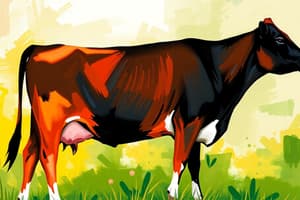Podcast
Questions and Answers
What is the characteristic rectal examination finding in Left Displacement of Abomasum (LDA)?
What is the characteristic rectal examination finding in Left Displacement of Abomasum (LDA)?
- A laterally displaced rumen and right kidney
- A medially displaced rumen and left kidney (correct)
- A laterally displaced rumen and left kidney
- A medially displaced rumen and right kidney
Which of the following is a sign of peritonitis in an LDA case?
Which of the following is a sign of peritonitis in an LDA case?
- Tachycardia only
- Decreased milk production
- Partial anorexia
- Localized abdominal pain (correct)
What is the name of the surgical technique used to correct LDA?
What is the name of the surgical technique used to correct LDA?
- Left paramedian abomasopexy
- Right paralumbar fossa omentopexy
- Right paramedian abomasopexy (correct)
- Left paralumbar abomasopexy
What is the likely diagnosis if a cow has a ketosis that is only temporarily responsive to treatment?
What is the likely diagnosis if a cow has a ketosis that is only temporarily responsive to treatment?
What is the primary diagnostic method for LDA?
What is the primary diagnostic method for LDA?
What is the name of the percutaneous method used to correct LDA?
What is the name of the percutaneous method used to correct LDA?
Which of the following is a common complication of LDA?
Which of the following is a common complication of LDA?
What is the likely diagnosis if a cow has a right-sided ping?
What is the likely diagnosis if a cow has a right-sided ping?
What is the significance of recent parturition in LDA diagnosis?
What is the significance of recent parturition in LDA diagnosis?
What is the primary difference between LDA and Abomasal Volvulus?
What is the primary difference between LDA and Abomasal Volvulus?
Flashcards are hidden until you start studying
Study Notes
Abomasal Disorders
- Abomasal disorders include left displaced abomasum (LDA), right displaced abomasum (RDA), abomasal volvulus, ulcers, and impaction.
- Displacement or volvulus is common in dairy cows, particularly high-producers, and also in bulls, calves, and small ruminants.
- LDA is much more common than RDA (8:1), and cases of volvulus are even less frequent (25 LDA to 1 volvulus).
Left or Right Displaced Abomasum and Abomasal Volvulus
- Abomasal displacement or volvulus occurs due to abomasal atony and gas production.
- Abomasal atony is related to high-concentrate, low-roughage diets.
- Contributing factors include decreased abomasal motility associated with hypocalcemia, concurrent diseases, changes in position of intra-abdominal organs, and genetic predisposition.
Pathogenesis
- A mild metabolic alkalosis with hypochloremia and hypokalemia are common in displaced abomasum.
- Hypochloremic metabolic alkalosis is due to abomasal atony, continued secretion of hydrochloric acid, and partial abomasal outflow obstruction.
Diagnosis and Treatment
- Diagnosis is based on the presence of characteristic ping on simultaneous auscultation and percussion and ruling out other causes of left- or right-sided pings.
- Treatment includes surgical correction (right paralumbar fossa omentopexy or right paramedian abomasopexy) and calcium borogluconate SC to restore normal abomasal motility.
- Closed (percutaneous) or open (surgical) techniques can be used to correct displacements.
Prognosis
- Prognosis after correction of simple LDA or RDA is good, with reported success of 75-95%.
- Volvulus has a variable and less favorable prognosis; a large quantity of fluid in the abomasum, a high anion gap, a high heart rate, a low plasma chloride concentration, and metabolic acidosis are associated with a poor prognosis.
Prevention
- Prevention involves feeding a complete ration, maintaining adequate roughage in the diet, avoiding postparturient hypocalcemia, and minimizing and promptly treating concurrent disease.
Abomasal Ulcers
- Abomasal ulcers affect mature cattle and calves and have several different manifestations.
- Etiology and pathogenesis are not well understood, but many different causes have been suggested.
- Abomasal ulcers can occur any time during lactation, but are common in high-producing, mature dairy cows within the first 6 weeks after parturition.
Studying That Suits You
Use AI to generate personalized quizzes and flashcards to suit your learning preferences.




